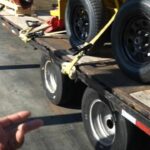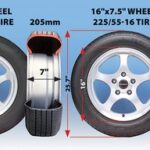If you’re pulling a trailer, it’s not uncommon to have the tires get hot. But why does this happen and is there anything you can do to prevent it?
There are a few reasons why your trailer tires may be getting hot.
One reason is that the air pressure in the tires may be too low. This causes the tire to flex more as it rolls, generating heat. Another reason could be that the trailer itself is overloaded or unbalanced, which puts additional stress on the tires.
Additionally, if the trailer isn’t properly ventilated, brakes can overheat and cause tire damage.
To help prevent your trailer tires from getting hot, make sure they are properly inflated and check the weight distribution of your load. Also, be sure to inspect your brakes regularly and allow adequate airflow around the wheels when parked.
By following these tips, you can help keep your trailer tires cool and avoid potential problems down the road.
If you’ve ever felt your trailer tires after a long day of driving, you know they can get pretty hot. But why does this happen?
Trailer tires are designed to carry heavy loads, so they need to be made of strong materials.
Unfortunately, these strong materials also tend to be good at conducting heat. That means that when the sun beats down on your trailer tires during the day, all that heat gets trapped inside.
One way to help keep your trailer tires from getting too hot is to make sure they’re properly inflated.
Hotter temperatures can cause tire pressure to drop, so check your tires often and top them off if necessary. You should also try to avoid extended periods of idling or driving at slow speeds, as this can also contribute to tire overheating.
If you notice that your trailer tires are getting hot frequently, it’s a good idea to have them checked out by a professional.
There could be an issue with the brakes or bearings that needs to be addressed before it causes any serious damage.
Why are My Trailer Tires Getting Hot?
Is It Normal for Trailer Tires to Get Hot?
Yes, it is normal for trailer tires to get hot. This is because when trailers are towed behind a vehicle, the friction from the road can cause the tires to heat up. If you notice that your trailer tires are getting hot, you can try to reduce the amount of time that they are in contact with the pavement by using tire covers or by raising the trailer off of the ground.
You should also make sure that your trailer tires are inflated to the proper pressure and that they are not overloaded. If you have any concerns about your trailer tires, you should consult with a qualified mechanic or tire specialist.
How Can I Keep My Trailer Tires Cool?
As the weather gets warmer, it’s important to take extra care of your trailer tires. Here are some tips to keep them cool:
1. Check the air pressure and adjust as needed. Overinflated tires can overheat and cause blowouts.
2. Inspect the treads for any wear and tear. Worn tires are more susceptible to heat damage.
3. Avoid extended periods of time in direct sunlight. If possible, park in a shady spot or cover the tires with a tarp when not in use.
4. Don’t forget about tire covers! They help protect against UV rays and excessive heat build-up.
5. Invest in tire temperature monitors so you can keep an eye on things while you’re on the road.
What Does It Mean When Your Tire is Really Hot?
If your tire is really hot, it could mean a few different things. It could be that you’ve been driving for a long time and the heat from the pavement has built up on the tire. Or, it could be that your tire is low on air and the lack of inflation is causing it to rub against the pavement, which creates friction and heat.
Either way, it’s important to check your tires regularly to make sure they’re properly inflated and don’t have any excessive wear. If you notice that one of your tires is significantly hotter than the others, pull over and investigate further to avoid a potential blowout.
How Do I Stop My Tires from Overheating?
If you’re worried about your tires overheating, there are a few things you can do to help prevent it. First, make sure your tires are properly inflated. Overinflated tires can cause heat build-up, so check your tire pressure regularly and inflate to the proper level.
Second, avoid sudden starts and stops when driving. Sudden braking or acceleration can generate a lot of heat in your tires, so try to keep a smooth driving style. Third, don’t overload your vehicle.
An overloaded car puts extra strain on the engine and tires, which can lead to overheating. Finally, if you’re going to be driving in hot weather or on long journeys, take breaks often to let your car cool down. This will give your tires a chance to cool off as well.
By following these tips, you can help keep your tires from overheating and ensure a safer drive for everyone involved.
Why are My Tires Getting Hot
If you’ve ever felt your tires and they were hot to the touch, you may have wondered why. There are a few reasons why tires can get hot and it’s important to know what they are so you can avoid any potential problems.
One reason why tires can get hot is if they’re overinflated.
This means there’s too much air in the tire and it can cause the tire to flex more than it should. This flexing can generate heat and that’s why your tire may feel hot. It’s important to check your tire pressure regularly to avoid this problem.
Another reason forhot tires is excessive speed. When you drive too fast, the tires spin faster and that also generates heat. If you’re going too fast for the conditions, such as on a wet road, you’re at an even greater risk for generating heat in your tires.
So always obey posted speed limits and drive according to the conditions.
If you notice your tires are getting hot, pull over and let them cool down before continuing on your way. And make sure to check your Tire Pressure Monitoring System (TPMS) if your vehicle has one; it can warn you of over inflated tires so you can take care of the problem before it becomes a bigger issue.
How to Tell If Trailer Tires are Bad
If your trailer has been sitting for a while, or if you’ve just bought it used, you might be wondering how to tell if the tires are bad. Here are a few things to look for:
1. Check the tread depth. The minimum tread depth for trailer tires is 4/32″. Use a tire tread depth gauge to check the tread depth, or simply insert a quarter into the tread groove. If the top of George Washington’s head is visible, the tire needs to be replaced.
2. Look for cracks, cuts, or other damage. Any damage to the tire can weaken it and cause a blowout. Inspect the sidewalls and tread carefully for any signs of damage.
3. Check the date code. Trailer tires have a six-digit date code stamped on them (like 121899). The first two digits indicate the week of manufacture, and the last four digits indicate the year.
For example, 121899 would mean that the tire was made in December 1999.
Boat Trailer Tires
Boat trailer tires are an essential part of towing your boat. They provide the necessary grip and traction to keep your boat safe while being towed. There are a few things to consider when choosing the right tires for your boat trailer.
First, you need to know the weight of your boat. This will help you determine the load capacity that you need for your tires. Next, consider the terrain that you’ll be driving on.
If you’ll be mostly on paved roads, then all-terrain tires may not be necessary. However, if you’ll be driving on rougher terrain, then all-terrain tires would be a wise choice.
Finally, think about the price of the tires.
Boat trailer tires can range in price from around $100 to over $1,000 depending on quality and size. Shop around and compare prices before making your final decision.
With these factors in mind, choosing the right boat trailer tire should be a breeze!
Travel Trailer Tires
If you’re like most RVers, you probably don’t give much thought to your travel trailer tires – until they go flat, that is. Then, all of a sudden, you realize just how important they are!
It’s important to keep your trailer’s tires in good condition and properly inflated at all times.
Not only will this help prevent flats, but it will also improve fuel economy and extend the life of your tires.
Use a tire pressure gauge to check the pressure when the tires are cold (not after driving). The correct inflation pressure will be listed on the sidewall of the tire. 2. Inspect the tread regularly for wear and tear.
If the tread is getting low, it’s time to replace the tire. You don’t want to wait until there’s almost no tread left – that could be dangerous! 3. Keep an eye out for any cracks or other damage to the sidewalls of the tire.
If you see anything suspicious, get it checked out by a professional right away. A small crack can quickly turn into a big problem if not addressed promptly.
Best Trailer Tires
There are a lot of factors to consider when purchasing trailer tires. You want to make sure you get the best possible tires for your money, and that they will be durable enough to last through multiple road trips. Here are some tips on how to choose the best trailer tires for your needs:
1. Decide what size tire you need. Trailer tires come in many different sizes, so you’ll need to know what size tire is appropriate for your trailer. The size will be determined by the weight of your trailer and the number of axles it has.
2. Consider the load capacity. Each tire has a different load capacity, so you’ll want to make sure you get tires that can handle the weight of your trailer and its contents.
3. Choose a tire with a good tread pattern. A good tread pattern is important for traction, especially in wet or icy conditions. Make sure the tread pattern is appropriate for the type of terrain you’ll be traveling on most often.
4. Compare prices and reviews before making a purchase. It’s important to do some research before buying trailer tires since there can be significant price differences between brands and models.
13 Inch Trailer Tires
13 Inch Trailer Tires
There are many different sizes of trailer tires on the market, but the most common size is 13 inches. That’s because this size offers a good balance between load capacity and maneuverability.
Plus, it’s easy to find replacement tires in this size if you ever need them.
If you’re shopping for new trailer tires, here are a few things to keep in mind:
– Load capacity: The first thing to consider is how much weight your trailer will be carrying.
13 inch tires typically have a load capacity of around 1,500 pounds. So if you have a lightweight trailer, this may be the perfect size for you. But if you plan on carrying a lot of weight, you may want to upgrade to a larger tire size.
– Tire pressure: It’s important to check your tire pressure regularly (at least once per month). This will help ensure that your tires are properly inflated and can carry the maximum amount of weight safely. Under-inflated tires are more likely to fail and can cause an accident.
– tread depth: Another important factor to consider is tread depth. Trailer tires with shallow tread depths may look fine at first glance, but they won’t grip the road as well in wet or icy conditions. That could lead to dangerous accidents.
So make sure you choose trailer tires with deep tread depths for optimal safety.
Conclusion
The author of the blog post explains that there are several reasons why trailer tires may be getting hot. One reason is that the trailer may be overloaded, which puts extra stress on the tires and causes them to heat up. Another reason could be that the trailer’s brakes are not working properly, which can cause the tires to overheat from friction.
Finally, if the trailer is being towed in hot weather conditions, this can also lead to tire overheating. The author recommends checking these potential causes before taking any further action.









